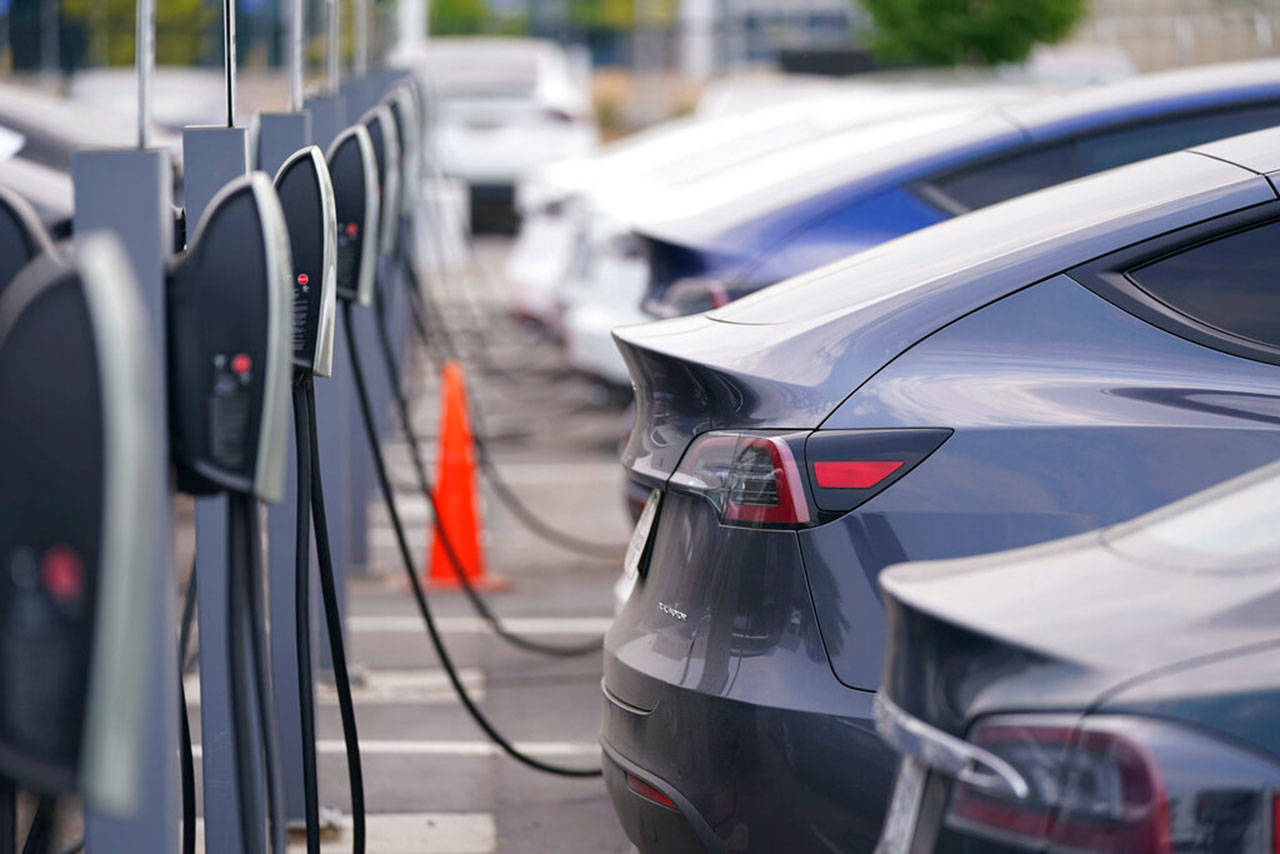By The Herald Editorial Board
The merger of two separate but related pieces of legislation in Olympia — now approved by the House and Senate — strengthens what each sought to accomplish: encouraging and preparing for cleaner and greener transportation in Washington state and doing so within this decade.
The first bill sought to set a requirement that all new vehicles sold in the state, as of 2030, would have to be zero-emission vehicles, either plug-in electrics or other zero-emission vehicles. During the course of the session, that legislation, facing some push-back, was stepped down from a mandate to a goal; still a useful tool for encouraging more to consider purchasing plug-in electric vehicles — EVs — as a meaningful way to reduce the state’s largest source of greenhouse gas emissions.
The second piece of legislation, House Bill 1287, looks at what happens on the other end of the plug, helping to ensure access to a reliable and easy-to-locate system of stations for charging electric vehicles on the road and at home. That bill requires the state Department of Commerce to develop and maintain a map of publicly available electric charging stations while forecasting future needs; requires private and public electric utilities to plan for increased demand as the number of electric vehicles on the road grows; and requires rule changes in the State Building Code regarding charging stations at residential apartments.
As the price of electric vehicles has steadily declined and the mileage range of their batteries has increased, the last bit on hesitancy on the part of the car-buying public has been the availability of charging stations, especially when miles from home. Running out of juice — rather than gas — puts a new twist on the old problem of running on empty. The legislation will help ensure that as more EVs hit the road, the charging infrastructure — particularly for fast-charging — will be nearly as common as gas stations.
Coltura, a Seattle-based group advocate for the transition to cleaner alternatives to fossil-fueled vehicles, pushed for the legislation it called Clean Cars 2030.
“With the passage of Clean Cars 2030, the end of the era of gasoline-powered cars is in sight,” said Matthew Metz, co-executive director of Coltura in a release. “Clean Cars 2030 sets Washington on a nation-leading path consistent with climate science and an auto industry trend toward a fully-electric automotive future.”
In combining the bills, with contributions by state lawmakers — in particular Rep. Nicole Macri, D-Seattle; Rep. Alex Ramel, D-Bellingham; and Sen. Marko Liias, D-Lynnwood — the legislation wraps in the 2030 goal for new vehicle sales to be electrics, while tying it to another necessary transition: the shift from the state’s gas tax to a road-usage charge, also known as a per-mile fee.
Already losing ground as a sustainable revenue source, the gas tax’s reliability for funding roadway maintenance and construction is further drained with every mile driven by a plug-in electric vehicle as it passes the gas station. Nor is the state’s current system of an annual flat fee for EVs adequate to meet revenue needs or fair to any motorist.
The legislation addresses that by providing that once the road-usage charge is used by 75 percent of the registered vehicles on the state’s road, the 2030 goal kicks in.
Establishing the road-usage charge will take time and effort — as well as a campaign to convince vehicle owners who are leery of accepting the swap — but has been advanced by earlier study through a successful pilot program in the state. The Clean Cars 2030 legislation provides a deadline that will help hold lawmakers and officials to keeping commitments to both the Clean Cars goal as well as the transition away from the gas tax.
Beyond the environmental community, the legislation also has support from those in the automotive and business communities, in particular the Washington State Auto Dealers Association. Automakers are accelerating their own commitments to EVs. GM earlier this year announced it would sell only zero-emission vehicles by 2035, and other automakers have made similar commitments for the U.S. and European markets.
The legislation also positions the state to take advantage of the Biden administrations’ plans to invest $174 billion for electric vehicles and EV charging stations, as part of its planned infrastructure investments.
Liias, in a commentary published this week in The Herald, noted the momentum behind the transition to EVs and its support among the auto industry, government officials and the driving public.
“This bill will ensure that our communities, businesses, infrastructure and economy are ready to take full advantage of the opportunities that come with an electric transportation future,” he wrote.
Much of this related system of infrastructure, revenue, markets and consumers still needs to come together and in the relatively short span of this decade. But the legislation now passed and soon on its way to the governor’s office provides clear directions for getting there.
Talk to us
> Give us your news tips.
> Send us a letter to the editor.
> More Herald contact information.

























